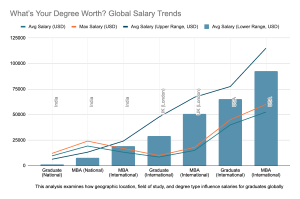-
While social media fame is often tied to luck or connections, international education continues to offer Gen Z a merit-based path to success and career stability.
-
Due to tightening U.S. visa policies, students are increasingly turning to alternative global destinations like the U.K., France, Germany, and Australia for higher education.
-
Organisations like Prodigy Finance are adapting to this shift by expanding support to more universities beyond the U.S., in response to growing student demand.
-
With higher post-graduation earning potential in countries like the U.K. and the U.S., studying abroad remains a strong return on investment for ambitious students.
[London, July 2025]: Many believe that achieving fame on social media, as an influencer or as a celebrity, leads to a perfect lifestyle and wealth. However, this often depends on having a “Godfather” figure or simply being lucky. In contrast, education is based on merit, allowing talented individuals to succeed without needing connections.
Studying abroad has become popular among Gen Z as more students seek top universities, especially in the U.K. and Europe, due to tightening U.S. visa policies. This shift may raise concerns for education lenders who primarily support only U.S. universities. However, organisations like Prodigy Finance are seeing an increase in interest for destinations that were previously less popular, such as the U.K., Germany, and even Australia.
Sonal Kapoor stated, “The Prodigy Finance team diligently monitors the trend of students shifting to other destinations and works to onboard more universities to provide better options. Despite the ongoing visa crisis, students continue to apply to study in the USA. Some are willing to wait a year for the situation to improve, while others have already made the switch. The demand for studying abroad is expected to increase as students pursue quality education and better career opportunities.”
The reality of studying abroad includes potential earning opportunities after graduation. Here’s a breakdown of typical entry-level salaries in various regions:
According to data from Indeed, Glassdoor, and several other platforms, entry-level graduate roles vary significantly across sectors and regions, presenting a diverse picture of earning potential for new graduates. Here’s a detailed breakdown:
India
General Graduates: The average salary for new graduates is approximately ₹18,000 per month (₹2.16 lakh/year) according to Indeed. Jooble reports an average annual salary of ₹2.1 lakh for fresh graduates, with most salaries ranging from ₹2 lakh to ₹2.4 lakh per year. For graduates with a BCom or similar degree, starting salaries typically range from ₹2.5 lakh to ₹3.5 lakh/year, depending on specialization and location. Graduates in major metropolitan areas (e.g., Bangalore, Mumbai, Delhi) and in-demand sectors can earn higher salaries, with average salaries for graduates across India reported as ₹5.4 lakh per year by Jooble, although this includes experienced professionals as well.
IT & Tech Roles: Entry-level salaries in IT and software development are higher, with TeamLease reporting averages of ₹6.2 lakh to ₹9.4 lakh/year for roles in IT services and Global Capability Centres (GCCs). Cybersecurity and network administration roles in GCCs can reach ₹9.6 lakh/year.
MBA Graduate Salaries: MBAs from reputable institutes typically start at ₹6 lakh to ₹12 lakh/year. Graduates from top business schools (IIMs, ISB) often receive offers in the ₹20 lakh to ₹30 lakh/year range, with some exceptional placements exceeding this. Specialisations like finance, analytics, and IT management can command starting salaries of ₹8 lakh to ₹30 lakh/year.
United States
General Graduates: According to Indeed, the average annual salary for entry-level positions in the United States is $43,262/year (as of June 2025). Salaries range from $40,000 to $62,000, depending on location and field. Salaries vary by field, degree, and location, with higher pay in tech, finance, and consulting.
IT & Tech Roles: Indeed reports the average salary for an entry-level software engineer is $71,543/year (as of June 2025), with job postings ranging from $70,000 to $95,000/year for new grads at major companies. Entry level mechanical engineers can earn an average of $66,930/year.
MBA Graduate Salaries: Glassdoor and NACE report average starting MBA salaries in the range of $75,000 to $102,000/year. MBAs in specialized fields like finance, consulting, and tech can start between $100,000 and $130,000/year.
United Kingdom (London)
According to Graduate Labour Market Statistics by Gov.UK, the median starting salary for new graduates in London is approximately £28,634 per year, the highest among UK regions for entry-level roles. For all working-age graduates (not just new graduates), the UK-wide median salary is £42,000 per year.
IT & Tech Roles: Indeed data also shows entry-level software engineers in London earn an average of £44,354/year. Total compensation (including bonuses) for tech roles can earn an average of £63,638/year.
MBA Graduate Salaries: Indeed data shows that the average salary of an MBA graduate is around £43803/year. Those in tech and consulting can earn £45,000 to over £60,000/year, especially at prestigious firms.
This analysis highlights how geographic location, field of study, and degree type affect salary expectations for graduates globally.
 Kapoor added that studying abroad can be one of the best decisions of your life, but it’s essential to conduct thorough research before making your choice. Neglecting to do so may hinder your chances of securing better job opportunities. Make sure to select a reputable university and a reliable education lender to help ensure you feel supported while living in another country.
Kapoor added that studying abroad can be one of the best decisions of your life, but it’s essential to conduct thorough research before making your choice. Neglecting to do so may hinder your chances of securing better job opportunities. Make sure to select a reputable university and a reliable education lender to help ensure you feel supported while living in another country.
 Newspatrolling.com News cum Content Syndication Portal Online
Newspatrolling.com News cum Content Syndication Portal Online







